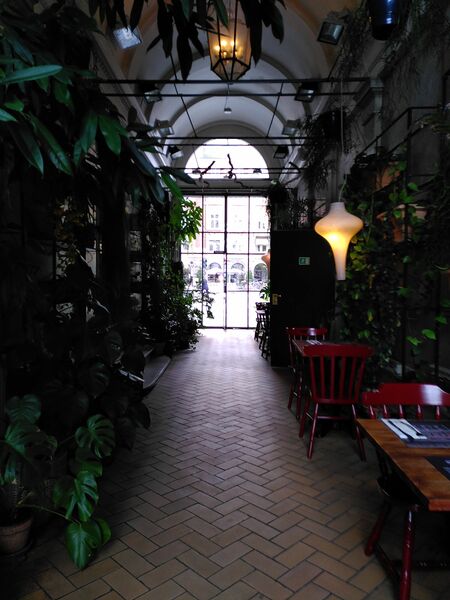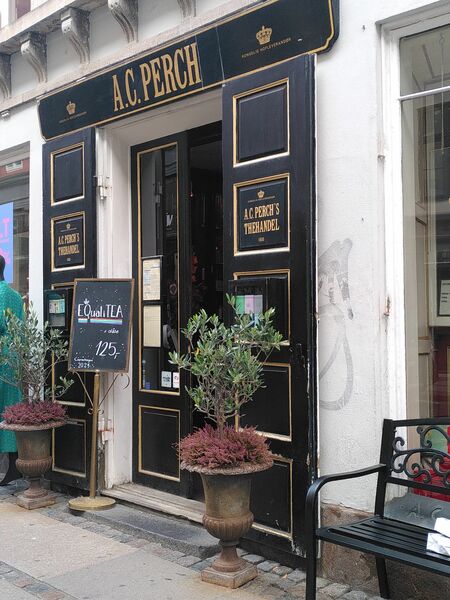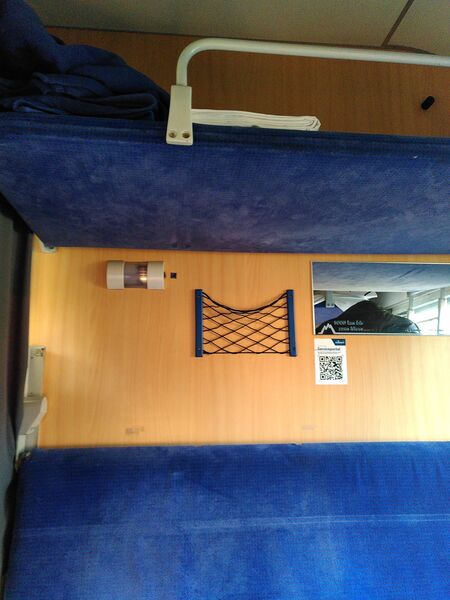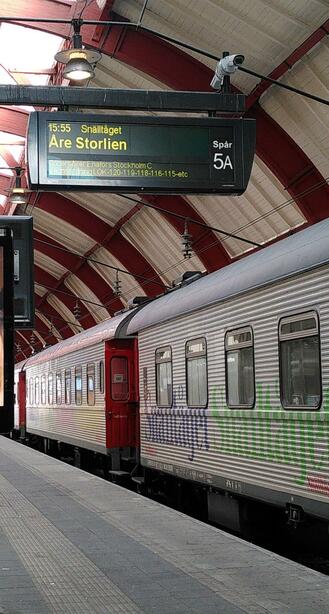If there is a European city where it's absolutely unnecessary to compromise on
sustainability when travelling, this is most certainly the Danish capital.
Even if you – like we on our
train travel from Munich to Trondheim, on a one-night stop-over, with too little time for up-front research – are willing to take your usually organic diet with a grain of salt, relax!
It's as simple as keeping in mind the following three brands: Irma when it comes to provisions and daily necessities, Emmerys for a coffee or lunch break and sandwiches, and the Guldsmeden Hotels for a comfortable night in style. All these three chains have sufficient branches within the city that you always will find one.
Where to stay
As long as your budget isn't really tight, thread yourself with a luxury night in one of the owner-run Guldsmeden hotels. The rooms in these design hotels are all carefully designed in a way that makes you feel to have much more space at hand than you actually have: The huge canopy bed is separated from the sitting area with a wall, the bath rooms are all equipped with both, (a small) bathtub, shower and sink, and since everything is decorated in a blend of Balinese and Danish design, with a focus on longevity and sustainability there's always a feel of tropical holiday over it, no matter what the weather is like.
As a guest you are encouraged to take with you your used vanity set, tooth brush, salt deodorant and other small bathroom items for prolonged use; the luxury natural bodycare which is provided in big dispensers at the bathroom can be bought from the hotel reception or from the webshop. Organic coffee and tea is provided on the room, including tiny pyramid packs with organic milk. Unfortunately one-way paper cups are provided instead of re-usable glasses or cups. This is justified as a fire protection measure which I – given the inflammability of paper compared with glass or steel – find hard to reasonably believe.

This time we stayed at the
Babette hotel at Esplanaden, opposite the Kastellet fortress and park, with its beautiful orangery-type entrance area and a branch of the famous Skagen seafood restaurant serving as the hotel's restaurant.Although the restaurant has a focus on sustainability it's not dedicated organic. While the food itself -- the luxury form of fish-based fast food -- was both, tasty and filling, their drinks menu did not include a single organic item, and the wine selection was outrageously disappointing. There's a 10 percent discount for hotel guests.
Breakfast at the Skagen facilities is a different affair: A 100 percent organic, tastefully arranged buffet where every single item is worth a try. Unfortunately they did not serve my favourite muesli from earlier stays in Oslo and Kopenhagen: toasted and caramelised cubes of yesterday's flavour-rich dark-brown bread, blended with seeds and nuts.
Like
other hotel commodities as bicycles and the entrance to the beautiful roof-top spa breakfast is not included in the price for the night.
A few years ago we stayed at the smallest (and eldest) of all Guldsmeden hotels, the
Carlton 66 in the former meat-packing district ("Kødbyen") of Vesterbro. This intimate bourgeois city villa with its narrow stairs is a truly romantic affair, but a word of advise if you come with heavy baggage: Unlike in other countries hotel staff in Scandinavia is treated equal. So -- while you may kindly ask for help if you are of delicate health -- do not expect them to carry your luggage.
The Carlton is only a short walk away from the Guldsmeden's business hotel, Axel. If you stay at the Carlton and fancy a drink at a hotel bar or wish to use their luxury spa, treat yourself with an evening stroll.
Where to eat (and have a coffee)
If the hotel breakfast at one of the Guldsmeden hotels doesn't match your budget, there's no need to dispair: Find one of the numerous branches of Emmerys cafes and bakery shops (There are so many I won't list them here) and treat yourself with their fully organic bakery items, both to have on the spot and to take away. In addition to classic Danish brown sourdough breads and rolls they also make interpretations of Italian and French white breads and rolls. While some places have special breakfast and lunch menus, you may always have different types of Danish smørrebrød and Italo-American-style sandwiches, both with and without meat and/or cheese.
Unfortunately salads and fruit drinks to take away are still prepared and sold in one-way plastic cups, and there's no deposit scheme for cups or bowls.
If you have sufficient time, rather opt to take a seat and be served your drink in glass or earthenware. And be sure to add one of their gorgeous sweets to your coffee order -- if only a piece of their famous white brownies.
Where to buy provisions and daily necessities
Whether you are shopping for provisions or plan a picnic in a park, a branch of the nation-wide operating supermarket co-operative
Irma is usually just around the corner. While
other supermarket chains lately have started to advertise with their
small selection of organic and fairly-traded goods as a cover-up for their generelly unfair and planet-threatening practises, this chain has truly been working towards a more sustainable lifestyle in Denmark for years: Although most items sold here still is conventional produce, you have clearly marked organic alternatives for almost all products at hand, placed in a way that makes it easy to choose the more sustainable alternative in the first place, without much reading. Still, also shopping here requires attention to organic labels and some abstinence if you want to reduce one-way plastic.
What to do
If you love tea and fancy a short travel in time, pay a visit to A. C. Perch's Thehandel from 1835. In the tiny shop of the royal warrant holder shop assistants with dark-green aprons measure high quality loose-weight tea into paper bags, needless to say using shiny brass mechanical scales. The bags are lettered by hand and closed with rubber bands. Not all of the teas are organic, but you have a great assortment to choose from, and you will also find organic ginger snaps.

If you have sufficient time and are in the mood for having tea of your choice (or organic fruit juice) in style enter A. C. Perch's Tea Room next door (it is advisable to book a table in advance). The food is not dedicated organic but do not hesitate to enquire about organic ingredients on the menu.
The entire venture is a small Scandinavian chain, with two more tea rooms in Aarhus and the Norwegian capital of Oslo, and
tea shops at CPH Airport, in Aarhus, and in Oslo.
The Danish love sausages and hotdogs, and if you do, too, there's no reason to spend your money on mediocre conventional fare: Amid the pedestrian zone of Strøget, in front of Holy Ghost Church, you'll find a fully organic hotdog stall:
Den økologiske pølsemand ("The organic sausage man"),
offers vegetarian and beef or pork sausages with organic veges and condiments, in an organic roll, as well as organic soft drinks. You should find a second stall in Christianshavn, in front of the Round Tower, but I hadn't time to check this out.
2022-02-18 11:00:00
[Copenhagen, Kobenhavn, Kopenhagen, Oslo, Aarhus, organic, fair, vegetarian, vegan, cafe, takeaway, coffee, tea, snacks, breakfast, lunch, hotel, accommodation]
Link

The idea was simple: Instead of flying – why not travelling climate-friendly? Most certainly this would take some time, but travelling Oslo–Berlin–Paris took time for the famous painters, writers and artists more than a hundred years ago, too.
Upfront research showed that it would have been possible to reach Trondheim within a little more than two nights and a day during the summer 2021, but we were restricted to travel in the first half of September by the date of a family festivity, limited days off from work and the end of the Bavarian school holidays. With only 10 minutes connecting time in Hamburg and, in case of a miss, the next possible connection one week later due to change of timetables on the Swedish part, we gave up on the plan of the fastest possible route. Instead two additional nights, one in Hamburg, and one in Copenhagen, would not only give us a little leisure to re-visit these cities, it would also increase the amount of money to spend: If you decide to travel Europe by train and do not have all the time of a university break a reasonably priced Interrail ticket simply won't suffice.
Finally the travel itinerary came up to
Altogether four nights and about three and a half days involving six train companies – most of them not co-operating. Had we had the time and money for a return trip it would even have been possible to take bicycles on the tour (at least to the Norwegian border).
Amidst the covid-19 pandemic a new privately held German train company took the courage to re-establish over-night travel by train on the North-South line through Germany, one part of the train departing from Salzburg, another from Konstanz by the lake Bodensee to be united on their way to the island of Sylt via (among others) Munich and Hamburg. The train is operated two times per week and tickets can be booked online only. The company informed by e-mail that the departure of the train wouldn't be visibly announced at the train station, but sent time, platform and car location for all stations on the route.
With this information at hand I didn't get nervous when the display at platform 6 in Munich Ostbahnhof announced that all trains would depart from platform 11 or 12 (presumably due to the strike of the Deutsche Bahn train drivers in the summer of 2021). Some fellow passengers found out that this also applied to the Alpen-Sylt-Express, and the entire crowd moved over.
What didn't show up in time was the train by the time of arrival and not even by the time of departure, and as announced, there simply was no information. A helpful staff member of the Austrian train company ÖBB reassured us that the train would arrive here, and finally it appeared on the platform display and, by about half an hour delayed, arrived.

From now on everything went smooth (at least until we reached the Norwegian border). Due to the pandemic no strangers were booked into the former Deutsche Bahn couchette compartment which came at a price of 300 EUR for the two of us. The interior as well as the common wash and toilet facilities were clean, though a little worn. The almost doubly priced (or, in luxury class even more expensive) sleeper (with private room) is of French origin, and there's a very competitively priced seat car (starting at around 70 EUR).
On the train it would have been possible to order a pair of organic soft pretzls, organic tomato soup and organic porridge for dinner and breakfast, though no organic drinks.
Clean sheets were provided for all six sleeping places, and despite being a German train the proper way of sleeping was the Southern way wrapped into the sheet and covered with a blanket. Needless to add that in the couchette car you are expected to make your bed yourself. Complimentary drinking water to brush your teeth was not provided.
Danske Statsbanen (DSB) and Deutsche Bahn (DB) co-operatively run the city connection between Hamburg and Copenhagen via the Storebelt bridge, so buying tickets more or less spontaneously and without providing personal data, at a German or Danish train station usually shouldn't be an issue. The direct IC train runs four times a day to and fro and keeps waiting at the platform in Hamburg central station between arrival and departure. Unfortunately you aren't allowed on board more than fifteen minutes before departure – the train will be closed while the staff is having their break.
There are more connections where you have to change trains, but with almost all of them the journey takes around five hours.
The direct Intercity train is comfortable and – just as the night trains – has capacity for bicycles. Ticket prices vary, depending on whether you have a Bahncard discount card, as well as on how long in advance and where you buy it.
Effectively an urban train line over the Öresund bridge tickets for the Öresundtåg regional train can be bought from the ticket machines at København H – anonymously as long as you see away from the card payment which is the most comfortable payment method if your stay in Denmark isn't long enough to use Danish cash.
Since we travelled during the covid-19 pandemic passports had to be provided in the train which stopped but was closed during the border control.

Malmö–Åre/Storlien on the Snälltåget night train
As far as I know night trains between Stockholm and the Swedish-Norwegian border at Storlien have been running for ages, and quite recently the privately held Snälltåget has extended its network to Berlin (via Copenhagen and Hamburg).
During the summer we could have travelled Munich–Berlin with Deutsche Bahn, with four hours the fastest train connection within Germany, and taken the Snälltåget from there, but as the Swedish company changed to their autumn timetable this connection did not work out.
The ticket for two in a private couchette came at 4000 SEK (about 400 EUR) and had to be booked on-line. Due to covid-19 restrictions the remaining four beds weren't filled up, but we were given all six complementary packs of drinking water. The choice at the restaurant car dubbed "Krogen" was limited due to the pandemic, and did not include any single organic item.
Washing facilities in the couchette car are limited to the common toilet.
The beds are a little wider than on the Alpen-Sylt-Express which might have been the reason for that my sleep was deeper and less disturbed during that night. On this train we were given duvet covers.
The train is provided at Malmö C in good time before departure, so we were able to board almost an hour before.
By the way: The train company's name, Snälltåget, is a play on words. The Swedish word "snäll" means "nice" and is a false friend with the German word "schnell" meaning "fast". Before IC and ICE trains took over the city connections in Germany, the then faster trains were referred to as "Schnellzüge", "fast trains".
Åre/Storlien–Trondheim: The last miles
What should have been a 1.5 hours train ride with the Meråkerbanen regional train
from the Snälltåget's final destination Storlien to Trondheim, turned out to be a show stopper for climate-friendly travel as well as a tedious money sink.
When planning the journey in June 2021, the timetables of Meråkerbanen were still on-line, although we expected a rail replacement bus service due to the ongoing electrification work on the route (just like on our last train journey from Stockholm to Storlien in 2017). What we did not expect was that there was no public transport service at all!
Locals told us that the connection has not been operated for the entire covid-19 pandemic, mainly because the Norwegian and the Swedish side wouldn't agree on the test and vaccine control procedure at the border.
So we had to hire a cab from one of the taxi companies in Åre: Taxi Åre did not have any cars left, but Topptaxi was willing to drive us from the train station of Åre over the border to the nearest Norwegian village, Meråker, at the hefty price tag of 2100 SEK. Due to an initial misunderstanding on behalf of the taxi operator we ended up paying only 1700 SEK for the 1.5 hours ride which would have been the price from Åre to the border. Given the fact that Storlien–Meråker would have been much shorter, this was probably a fair deal for both parties.
Since it was raining (the expected weather) we asked the taxi driver to drop us in front of the Coop Xtra hypermarket in Meråker where we could wait inside the "cafe" corner for the bus to Trondheim. A little more than an hour later we were heading over to the bus stop at Meraker school from where the bus no. 670 would take us to Trondheim. (Mind you that this 1.75 hours public bus service does not run on weekends.)
2021-09-18 16:30:01
[The_Conscious_Traveller, Germany, Denmark, Sweden, Norway, Salzburg, Munich, Konstanz, Hamburg, Berlin, Copenhagen, Malmo, Stockholm, Storlien, Aare, Trondheim, eco, nighttrains, trains]
Link





